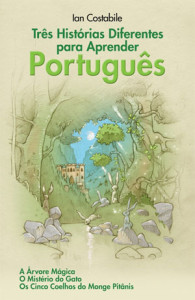Cactus Portuguese Teacher Book Success
Cactus has always been proud of the teachers who work for us, as they are all carefully selected for their skills, experience and personality.
This month we are delighted that our Brazilian Portuguese teacher Ian Costabile, based in Liverpool, has published an excellent book to help students learn Portuguese.
Três Histórias Diferentes para Aprender Português, or ‘Three Different Stories to Learn Portuguese’, is a collection of three stories cleverly designed to help Portuguese language students learn new vocabulary and sentence construction.
For anyone learning Portuguese – either Brazilian Portuguese or European Portuguese – this book uses different vocabulary, tenses, verbs and sentence structures in each of the three stories to maintain interest and cater to different abilities and interests. Above all, the stories are fun, making language learning fun!
Find out more about Ian’s book on his blog Português Azul – where you will also find plenty more inspiration and tips for learning Portuguese.
Cactus Portuguese Teacher
Ian moved from Brazil to the UK in 2009 and it was then that he started to teach Portuguese. A keen musician, he found that many of the people he performed to were interested in the Brazilian language and culture. Members of a local capoeira (Brazilian martial arts) group also came to him for Portuguese lessons. Since then, Ian has qualified as an interpreter and now teaches Portuguese at GCSE and A Level in an Academy in Liverpool.
It was in 2014 that Ian became a Cactus Portuguese teacher on our Portuguese evening courses in Liverpool. When asked how he found working for Cactus, Ian replied, “I find teaching for Cactus a great experience. It’s a very organised and competent company. All the groups of students that I taught through Cactus so far were very committed to learning and enjoyed every single lesson. Through Cactus I have met people from different backgrounds who showed a huge interest in Brazil, Portugal and Mozambique. I also became friends with other Cactus teachers and staff.”
We wish Ian the best of luck with his book! Anyone wishing to purchase his book can do so on Amazon.
If you have a language learning or language teaching query that you can’t find the answer to, please get in contact with us either by Facebook or by Twitter, or contact us here.





